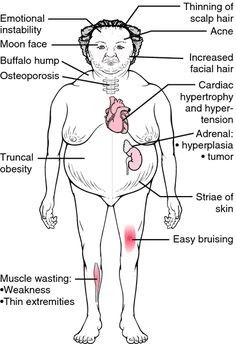Which information obtained by the nurse about a patient who has been taking prednisone 40 mg daily for 3 weeks is most important to report to the health care provider?
Patient stopped taking the medication 2 days ago.
Patient's blood pressure is 148/94 mm Hg.
Patient has bilateral 2+ pitting ankle edema.
Patient has not been taking the prescribed vitamin D.
The Correct Answer is B
Prednisone is a corticosteroid medication that can cause a range of side effects, including fluid retention, electrolyte imbalance, and increased blood pressure. A blood pressure reading of 148/94 mm Hg indicates hypertension, which may be related to the use of prednisone. It is essential to report this finding to the health care provider as it may require further evaluation and management, such as adjusting the medication dosage or initiating additional treatments to control blood pressure. The other information provided, such as stopping the medication, ankle edema, and not taking prescribed vitamin D, is relevant but does not pose an immediate threat to the patient's health compared to uncontrolled hypertension.

Nursing Test Bank
Naxlex Comprehensive Predictor Exams
Related Questions
Correct Answer is B
Explanation
IBD, which includes conditions such as Crohn's disease and ulcerative colitis, is characterized by chronic inflammation of the gastrointestinal tract. The symptoms can vary depending on the type and severity of the disease, but common symptoms in children with IBD include:
- Children with IBD often experience increased frequency of bowel movements, which may be loose or watery. This is often accompanied by urgency and a sense of incomplete evacuation.
- Chronic inflammation in the gastrointestinal tract can interfere with nutrient absorption, leading to poor appetite, decreased intake, and subsequent weight loss. In severe cases, malnutrition may occur.
- Inflammatory processes in the intestines can lead to increased motility and peristalsis, resulting in hyperactive bowel sounds.
Correct Answer is D
Explanation
Cholelithiasis refers to the presence of gallstones in the gallbladder or bile ducts. The most common symptom is right upper quadrant abdominal pain, which may be colicky or steady. Nausea and vomiting are also commonly associated with cholelithiasis.
Coffee ground emesis and constipation are not typical findings associated with cholelithiasis. Absent bowel sounds may be a sign of bowel obstruction but are not specific to cholelithiasis.

Whether you are a student looking to ace your exams or a practicing nurse seeking to enhance your expertise , our nursing education contents will empower you with the confidence and competence to make a difference in the lives of patients and become a respected leader in the healthcare field.
Visit Naxlex, invest in your future and unlock endless possibilities with our unparalleled nursing education contents today
Report Wrong Answer on the Current Question
Do you disagree with the answer? If yes, what is your expected answer? Explain.
Kindly be descriptive with the issue you are facing.
